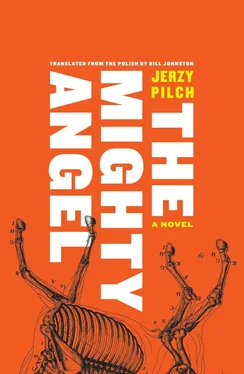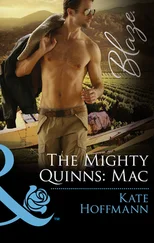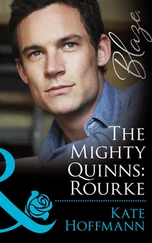After six weeks I would leave the alco ward, I would take a cab, I would enter and leave the pub called “The Mighty Angel,” I would enter and leave the store, take the elevator, open the door, and for the longest time I would stand dumbstruck on the threshold. Who had been here during my absence? Who on earth had been staying in the place while the owner was away? Who had been twisting and turning in fearful agonies in my bedding? Who had sweated urine-colored perspiration? Who had left a filthy bed sheet behind? Who had been reading The Magic Mountain and gotten to page 27, since it was lying open at that page on the floor? What speckled rats, what pale blue weasels must have made their nest here? Who had been reading newspapers? Who had been smoking cigarettes and leaving piles of butts all over? Who had slept in the armchair? Who had thrown towels on the bathroom floor? Who had left a tiger-striped headband in the hallway? What individuals, what ghosts had been at large? That’s right, rats and weasels must have made their nests here, and during their nocturnal tangles and hunting trips they must have upset everything and scattered it all from one corner to the other.
And where did the stifling atmosphere of debauchery come from, and the body lotion, and the lone hair on the pillow, and all the objects that had been moved from place to place by a woman’s hand? Often, as I lay in my damp bedding, I had had the impression that shades were moving around the empty rooms. Shades of skinny high school girls and shades of my ex-wives were leaning over me, seduced teenagers were opening the windows, novice nuns were making a hearty soup in the kitchen, sisters of mercy were holding up my forehead and uttering gentle words of succor as I engaged in the pious labor of puking my guts out. Women photographers, beautiful as a dream, were taking my picture, ambitious women reporters conducted in-depth interviews with me, and it was among them that I’d find my last love before death. I would stretch out my hands and encounter darkness. Someone was walking around the room, someone was lying in my bed and howling, howling in a lifeless voice.
I pressed the bottle to not-my mouth; at first the vodka wouldn’t flow, then it flowed, it flowed in a burning, sulfurous stream through parched lips and down the throat. It whirled in its fieriness, it murmured like a creek suddenly swelling after midsummer rains. The clear surface of the liquid was like a scalpel; it flowed through the innards and cut them open, and the stream of molten lava crossed a dead land, searching for a secret place, searching for the bay of tranquility.
•
Somewhere in my innards, between diaphragm, heart, and lungs, between the respiratory system and the circulatory system, between the lungs and the spinal column, there was a negative chakra, an anatomical hole, an inter-muscular or perhaps intercostal cavity shaped like a spindle and half a liter in capacity. I was like one of those heavy old Kalwaria wardrobes with a secret compartment; I would take the key, which was as silver as the screw top of a bottle, open the dark little door inside myself, and beneath my wooden heart I would place a half liter of Żołądkowa Gorzka. My heart would begin to pump blood and my lungs would fill with oxygen; daybreak would come, the dense fog would lift from the bay of tranquility, I would be light as a cloud and happy as a cured man, I would take one more well-calculated sip, rest my head on the pillow, and allow my gaze to stray idly across the ceiling. And my gaze would pass through the ceiling, and it would pass through all the ceilings above my ceiling, and through the roof of the building, and it would pass through the dark sky over Kraków or Warsaw, and it would traverse the stratum of low clouds and the stratum of high clouds, and it would pass through the light blue sky and the dark blue sky, and it would reach the black regions, and, in a firmament as black as Smirnoff Black or as Johnny Walker Black Label, I would see the constellations. Once again I would see the comet over Czantoria Mountain and once again I would see the constellation of the Mighty Angel.
Heavenly father of mine and drunken father of mine, and drunken father of my drunken father, and all my drunken forefathers, and all my drunken ancestors, and also all those unrelated fatalists who have seen and who know where the constellation of the Mighty Angel is located, all of you who were born and who died in its blue-and-gold glow — accept my greeting.
You would be standing by me, barely able to keep on your feet, yet, true to your pedagogical and parental mission, you’d be standing by me. There was Grandma Maria, the owner of the slaughterhouse; there was Granddad Jerzy, the postmaster; and there was Granddad Kubica, a big farm-owner; and my father, an ever-so-young soldier in the Wehrmacht; and my mother, a pharmacology student; and there was Doctor Swobodziczka. You were all standing by me and with trembling hands and shaking fingers you would point out the constellations and the stars: the North Star, the Plow and the Great Bear, and Berenice’s Hair, and Andromeda, and the Pleiades, and the trail of the Milky Way. The river roared, the trees soughed, the mountains stood as they have always stood, unmoved by your words or your breath, and over everything, the length and breadth of it all, was the constellation of the Mighty Angel. In the darkness I could clearly see all the stars that comprised it: Seven stars made up its swaying body, three its raised head, four its tipped-back hat; five bright stars showed its raised arm, nine indicated its wings, and ten stars, fiery as orange-flavored vodka, formed the bottle pressed to its thirsty lips, which were marked by a single dark, dark star. Beneath its feet were the Centaur, the Water Snake, and the Scales; at its right hand were the Lion, the Herdsman, and the Virgin; at its left was the Lyre; and above it was darkness.
WE WERE SITTING at the table with the suicides, and the nurses weren’t letting us out of their sight. Simon Pure Goodness was recounting for the hundredth time his fever of the previous year, during which a sleigh had been ridden through the air by the Angel Gabriel, or possibly by God himself. The paper tablecloths rustled as if starched, the candles shone, the suicides were beautiful and lost in thought, but they had come to the Christmas Eve dinner empty-handed, my Lord, and we didn’t forget that. We were sitting at the table: me, Don Juan the Rib, Fanny Kapelmeister, the Queen of Kent, Simon Pure Goodness, Christopher Columbus the Explorer, and the other less determinate characters, which is to say the Most Wanted Terrorist in the World, the scornful Sugar King, the venerable Hero of Socialist Labor, and the suicides. The nurses weren’t letting us out of their sight, and since all of them had already wetted their Christmas whistle they kept a close watch, staring at us with the well-known intensity of the drunkard.
Long ago, in Old Poland, before the Berlin Wall came down, when there was no segregation into alcos, schizophrenics, and suicides — many years ago, when I was rising from the dead here for the first or third time — what a to-do there would be when one of the suicides would go missing, when one of them would get lost in the labyrinth of hallways, which were built all the way back in the time of Tsar Nicholas or the Emperor Franz Joseph! The male and female nurses, the doctors, the orderlies, the auxiliaries, the ambulance drivers — they all went looking for him — even the kitchen staff would climb the wooden ladder into the attic! Everyone knew he was most likely up there, hanging from a rafter, or bleeding to death in the small room behind the laundry, having slit his wrists with a piece of glass. But that never happened. The missing suicide was quickly found; he was usually standing motionless by the last window at the end of the hallway, gazing through the untouched, half-transparent pane at a snow-covered field, at the brick walls of the Austrian or Russian barracks, at the dense smoke rising from the burning pajamas of the insane or from the furnaces of the Lenin Steel Mill. From that time on I had a soft spot for suicides; I liked them for the gravity with which they stared at the grass, a fragment of wall, a dark cloud.
Читать дальше












